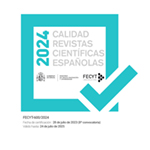La traducción literal del escritor Lu Xun (1881-1936) como impulso a la nueva literatura y lengua vernácula (baihua) en China
Resumen
a partir de la mitad del siglo XIX, China empezó a enfrentarse a la hegemonía y la invasión de las potencias occidentales. algunos intelectuales utilizaron la traducción como herramienta para introducir los estudios occidentales en China, sobre todo los de tecnología y filosofía, con el fin de favorecer la modernización de la sociedad. Otros intelectuales aprovecharon la traducción para estimular la evolución literaria y el paso hacia la lengua vernácula, el baihua. Entre ellos se encuentra el escritor Lu Xun (1881-1936), que defendia la traducción literal como motor para hacer evolucionar la lengua clásica hacia el baihua. Consideraba que mediante el baihua se podía lograr una literatura más cercana al pueblo y así educarlo. al mismo tiempo, la traducción de Lu Xun conllevaba cierta manipulación ideológica del traductor. Las obras traducidas por él, en general, presentaban personajes sufridos y revelaban la injusticia social. Lu Xun quería que los chinos aprendieran de estas obras literarias. Por otro lado, desde una óptica contemporánea, la opinión de Lu Xun y su insistencia en adoptar una traducción literal encuentra un paralelismo en la extranjerización que defiende Lawrence Venuti a la hora de oponerse a una lectura “fluida”. Salvando las distancias, tanto Lu Xun como Venuti señalan que el exotismo puede acercar la cultura extranjera a la literatura meta y, en cierto sentido, evitar la hegemonía de cada época.Descargas
Descarga artículo
Licencia
La revista Estudios de Traducción, para fomentar el intercambio global del conocimiento, facilita el acceso sin restricciones a sus contenidos desde el momento de su publicación en la presente edición electrónica, y por eso es una revista de acceso abierto. Los originales publicados en esta revista son propiedad de la Universidad Complutense de Madrid y es obligatorio citar su procedencia en cualquier reproducción total o parcial. Todos los contenidos se distribuyen bajo una licencia de uso y distribución Creative Commons Reconocimiento 4.0 (CC BY 4.0). Esta circunstancia ha de hacerse constar expresamente de esta forma cuando sea necesario. Puede consultar la versión informativa y el texto legal de la licencia.









